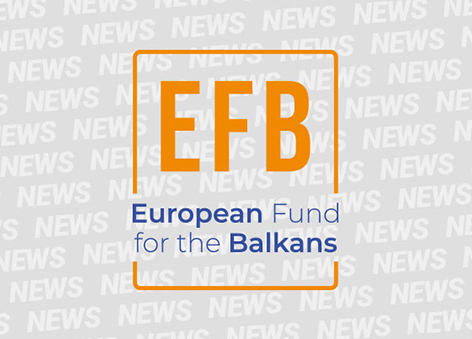
18.11.2013 All News
The conference “Good Governance from a cross-sectoral perspective” which took place in Zagreb in the period between November 7-8, 2013 in organization of the European Fund for the Balkans and the Regional Research Promotional Programme gathered 60 participants from the region in exchanging experience and practices during the 9 panel discussions, 2 interactive sessions and 3 break-out sessions.
Since the good governance concept has been a prominent topic during the last decade in the Western Balkans, this conference was a good opportunity to join forces and discuss this subject which is one of the key imperatives for the region which is still going through transition and aiming to join the European Union.
The agenda was designed to approach the discussion of the status and perspectives of good governance in the WB from a cross-sectoral perspective and through joining the representatives of the three key “sectors”: administration, academia and policy research organizations.
This discourse gathered policy-makers, social science researchers and policy analysts to discuss complex questions related to the Western Balkan region, its current status, obstacles and perspectives to move forward.
Hedvig Morvai (Executive Director of the European Fund for the Balkans) and Nicolas Hayoz (Director of Regional Research Promotion Programme-Western Balkans) together with the Swiss Ambassador to Croatia, Denis Knobel opened the conference, inviting the participants to a fruitful discussions and sessions.
Since the Croatia became part of the EU in July 2013, Zagreb was also a symbolic venue to hear about the lessons learned and regional perspectives for collaboration with the rest of the Western Balkans countries on their way to achieving the same goal.
The representatives from the state administration as Mr. Igor Vidacak (Head of Office, Office for cooperation with NGOs in the Government of Republic of Croatia), Mr. Dejan Jovic (Chief Analyst, Office of the President of Republic of Croatia) and Mirna Vlasic Feketija (Advisor to the Minister, Ministry for Foreign and European Affairs, Croatia) were chosen to present, comment and give an overview of the best practices which are being implemented in Croatia both from positive and negative perspective.
The panel discussions on the first day like “Good governance through evidence-based policy”, “Good governance in the EU integration context”, “Creating demand for good governance in the Balkans- Where do we stand? How do we proceed?” included keynote speakers with academic background like Nicolas Hayoz (Director of RRPP and Professorat the University of Fribourg), Milada Anna Vachudova (Associate Professor of Political Science, University of North Carolina at Chapel Hill, Vedran Dzihic (Assistant Professor at the Institute for Political Sciences at the University of Viena), but also civil society representatives and experts from the region like Venera Hajrullahu (Director at the Kosovo Civil Society Foundation), Malinka Ristevska Jordanova (Director of European Policy Institute), Owen Young (Programme director, International Centre for Policy Advocacy) and Lisa Quinn (Executive director, International Centre for Policy Advocacy). The representatives of the donor side - Katerina Haberli Harker (Senior Governance Advisor for the Swiss Cooperation Office, Serbia), Elda Bagaviki Berisha (National Programme Officer, Swiss Cooperation Office Albania), Fabrice de Kerchove (Project Manager, King Boudouin Foundation, Belgium) were also the reinforcing element to the conference which was aimed to present the current situation in the region in regard of the good governance and its weak and strong sides. Through the active participation of all the elements, the conference served as a means for discussing the potential issues that may be addressed in future to more effectively influence the policy development with scientific research results and projects.
Proactive approach, meaningful feedback, change of discourse, overall cooperation of the civil society and the governments, ICT support, creating a toolbox for good governance, leverage before accession to EU, well played reforms vs. in-depth transformative reforms, multifold transition, EU fatigue from a new wave of enlargement were some of the main direction that steered wide discussion with many questions addressed to the speakers and the participants.
The second day of the conference was reserved for the three break-out sessions reserved for “Management, efficiency and accountability – The good and the bad of the governance in the Balkans", “Good governance at regional and local level, Integration and good governance”, “Good governance, civil society, democracy and EU integration” served as parallel platforms for presenting around 40 most important good governance research and policy projects in the region and a peer exchange, through discussing the “good” and the “bad “of the good governance concepts, including indicators, standards, practices and regional variances in both of the civil service and public sector reforms.
It was concluded that in order to achieve progress in the area of good governance, an evidence-based approach to policy making needs to be accepted. This in turn requires strong inputs of policy research into the policy cycle, which is still a systemic deficiency of most governments and sectors in the Western Balkans countries. In order to create a stronger demand for (policy) research as a basis for policy making, stronger linkages between the administration (policy makers), academic and policy research communities need to be created and benefits of an evidence based approach to public policy need to be communicated and advocated.
Enhancing the communication between scientists, politicians and researchers and with the assistance of media and civil society, the result will be a well-informed public, reliable and verified date based polices and a more inclusive system of policy-making, necessary in this region’s transitional context.
All that is needed in order to create a healthy climate for potential cooperation, implementation of the principles of good governance and better EU perspective of the Western Balkans countries.






